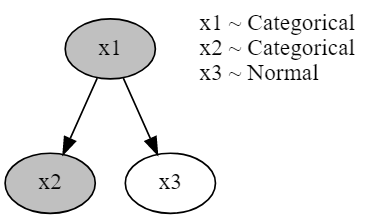Hi everyone, I am a beginner at probabilistic programming.
I am currently trying to perform probabilistic inference with a toy Bayesian Network example containing 2 Categorical observed variables X1, X2, and 1 Normal latent variable X3.
e.g. compute P(X1=1 | X2=2)
The Bayesian Network architecture as well as the code is illustrated as follows:

import pyro
import pyro.distributions as dist
from pyro.infer import TraceEnum_ELBO, config_enumerate
@config_enumerate
def model(x1_obs=None, x2_obs=None):
x1_probs = torch.tensor([0.7, 0.2, 0.1])
x2_probs = torch.tensor([[0.5, 0.2, 0.2, 0.1],
[0.6, 0.2, 0.1, 0.1],
[0.7, 0.1, 0.1, 0.1]])
x3_mu = torch.tensor([0., 1., 2.])
x3_sigma = torch.tensor([1., 1., 1.])
x1 = pyro.sample('x1', dist.Categorical(probs=x1_probs), obs=x1_obs)
x2 = pyro.sample('x2', dist.Categorical(probs=x2_probs[x1.long()]), obs=x2_obs)
x3 = pyro.sample('x3', dist.Normal(x3_mu[x1.long()], x3_sigma[x1.long()]), infer={'enumerate':'parallel', 'expand':True, 'num_samples':100})
def guide(**kwargs):
pass
conditional_marginals = TraceEnum_ELBO().compute_marginals(model, guide, x2_obs=torch.tensor(2.))
prob = conditional_marginals['x1'].log_prob(torch.tensor(1.)).exp()
print(prob)
It should be working by simply computing P(X1=1 | X2=2) = P(X2=2 | X1=1)P(X1=1)/P(X2=2) though…
Instead, I got stuck with an error of:
---------------------------------------------------------------------------
TypeError Traceback (most recent call last)
/tmp/ipykernel_845721/1298689924.py in
17 pass
18
---> 19 conditional_marginals = TraceEnum_ELBO().compute_marginals(model, guide, x2_obs=torch.tensor(2.))
20 prob = conditional_marginals['x1'].log_prob(torch.tensor(1.)).exp()
21 print(prob)
/anaconda3/lib/python3.9/site-packages/pyro/infer/traceenum_elbo.py in compute_marginals(self, model, guide, *args, **kwargs)
491 "compatible with guide enumeration."
492 )
--> 493 return _compute_marginals(model_trace, guide_trace)
494
495 def sample_posterior(self, model, guide, *args, **kwargs):
/anaconda3/lib/python3.9/site-packages/pyro/infer/traceenum_elbo.py in _compute_marginals(model_trace, guide_trace)
250 while logits.shape[0] == 1:
251 logits = logits.squeeze(0)
--> 252 marginal_dists[name] = _make_dist(site["fn"], logits)
253 return marginal_dists
254
/anaconda3/lib/python3.9/site-packages/pyro/infer/traceenum_elbo.py in _make_dist(dist_, logits)
219 if isinstance(dist_, dist.Bernoulli):
220 logits = logits[..., 1] - logits[..., 0]
--> 221 return type(dist_)(logits=logits)
222
223
/anaconda3/lib/python3.9/site-packages/pyro/distributions/distribution.py in __call__(cls, *args, **kwargs)
22 if result is not None:
23 return result
---> 24 return super().__call__(*args, **kwargs)
25
26
TypeError: __init__() got an unexpected keyword argument 'logits'
Is it due to the improper marginalization of the continuous variable X3 by TraceEnum_ELBO().compute_marginals?
Any help would be greatly appreciated! Thanks!